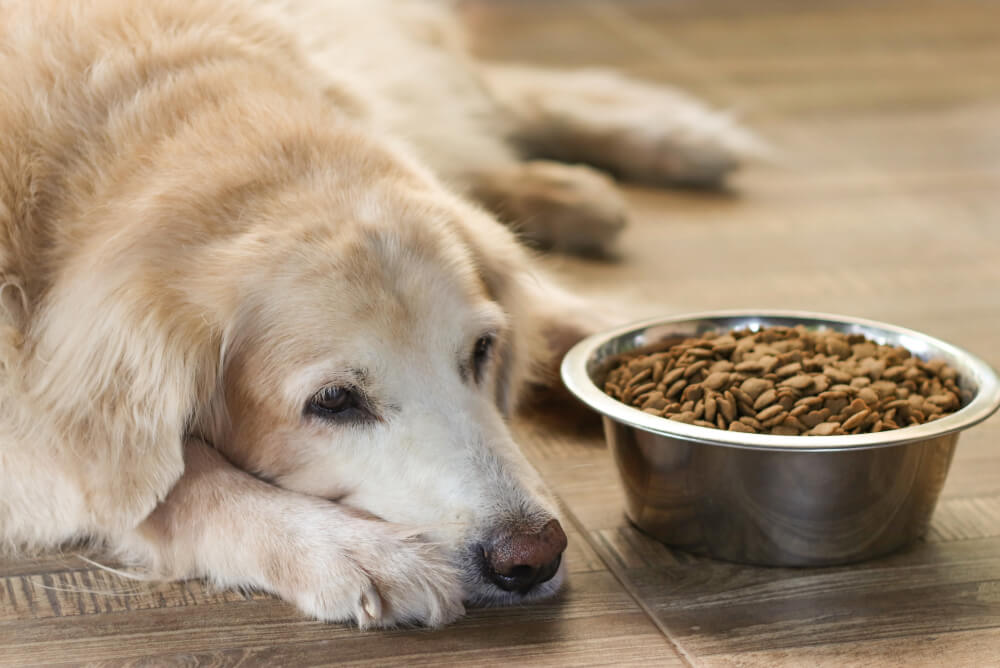
DogFoodAdvisor is reader supported See how
All reviews are 100% impartial but if you buy using links on this page, we may earn a referral fee.
What’s the best dog food for arthritis?
When choosing a food for a dog with arthritis, it’s important to focus on high-quality ingredients that promote joint health and provide optimal nutrition.
Look for foods that contain glucosamine, chondroitin sulfate and Omega-3 fatty acids via fish oil or an algal source.
If your arthritic dog is overweight, consider a dog food formulated for weight management to reduce strain on the joints. Maintaining a healthy weight is crucial for managing arthritis.
Avoid any dog foods that contain excessive fillers, artificial additives, and potential allergens, as they can exacerbate inflammation and discomfort.
Here you will find our recommendations of the best dog foods for arthritis which all meet the criteria described above.
You’ll also learn the answer to each of the 6 most frequently asked questions we get asked about dogs with arthritis.
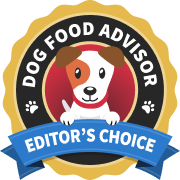
Best Food for Dogs with Arthritis December 2025
Here are The Dog Food Advisor's best dog food brands for Arthritis for December 2025.
-
Best Food For Senior Dogs With Arthritis
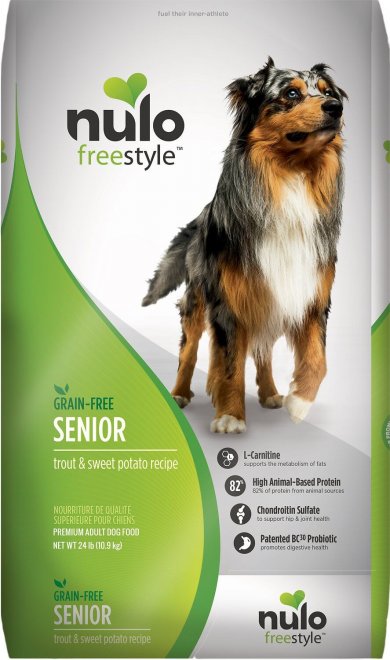
Nulo Freestyle Senior Trout & Sweet Potato
The Senior Trout and Sweet Potato recipe is one of 13 recipes included in our review of the Nulo Freestyle product line.
This particular recipe of its gets most of its protein from deboned trout. Dry matter label analysis reveals it contains 33.3% protein, 13.3% fat and 45.3% estimated carbs, resulting in a fat-to-protein ratio of around 40%.
This grain-free recipe is free from chicken and egg proteins but contains glucosamine and chondroitin to aid hip and joint health. Our in-house nutritionist, Laura Ward, also loves the fact it contains L-carnitine to support an older dogs’ metabolism, along with probiotic strains to help digestion and calcium and phosphorus to help your senior dog maintain strong bones.
Read our review of the full Nulo FreeStyle Dog Food (Dry) range here
Things we like
- Contains glucosamine and chondroitin
- L-carnitine to aid metabolism
- Calcium and phosphorus for bone strength
Main Ingredients Deboned Trout, Turkey Meal, Salmon Meal, Yellow Peas & Sweet Potato Type Grain-free Protein Percentage 33.3% AAFCO Standards Maintenance Best For Dogs and senior dogs Sample buyer review...
Read more buyer reviews at Chewy.com"My 12 year old lab had gained weight and was suffering from achy joint and no longer had desire to take walks. He seemed miserable. He skin was extremely itchy too. I switched to this food and used supplemental salmon oil and I see improvements in all areas. He is more active and happy."
-
Best Dry Food For Dogs With Arthritis
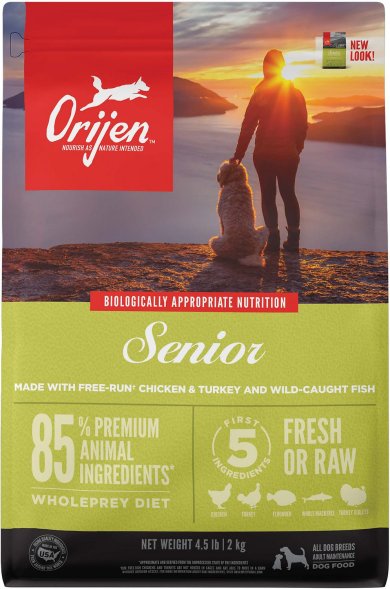
Orijen Senior
Orijen Senior formula contains approximately 85% quality poultry and fish ingredients, providing a strong source of essential protein, vitamins and minerals for older dogs.
It is one of nine recipes included in our review of the Orijen product line and dry matter label analysis reveals it contains 43.2% protein, 17% fat and 31.8% estimated carbs, providing a fat-to-protein ratio of about 39%.
This particular recipe contains nutrient-dense ingredients to help support a senior dog’s joint, weight and immune health, which is why we recommended it as the best dry option for dogs suffering from arthritis.
Read our review of the full Orijen Dog Food (Dry) range here
Things we like
- Formulated to aid joint function in senior dogs
- Grain-free
- 85% animal ingredients
Main Ingredients Chicken, Turkey, Salmon, Whole Herring, Chicken Liver & Dehydrated Chicken Type Grain-free Protein Percentage 43.2% AAFCO Standards Maintenance Best For Dogs and senior dogs Sample buyer review...
Read more buyer reviews at Chewy.com"I have always felt that this food ranks number one in kibble but could never afford it. Since the price reflects a thirty percent discount it puts it in my range. I especially like it is tailored to senior dogs and offers the glucosamine and chondroitin to help with old bones. When you open this bag you want to grab a fork and plate as it smells so fresh and enticing!"
-
Best Wet Food For Dogs With Arthritis
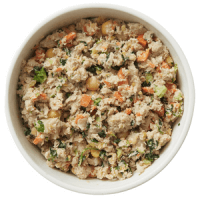
The Farmer's Dog Turkey
The Farmer’s Dog Turkey is one of four recipes included in our review of this fresh product line.
It gets the bulk of it protein from turkey, which is less likely to cause inflammation compared to some red meats, which can exacerbate arthritis symptoms. Our dry matter label analysis reveals it contains 33% protein, 19% fat and 40% estimated carbs, providing a fat-to-protein ratio of about 56%.
The Farmer’s Dog food is individually portioned depending on your dog’s needs, which means the chances of overeating are lower and health issues such as arthritis are easier to control and manage. Not only that, it’s highly digestible and made with fresh ingredients, offering a complete and balanced diet for dogs of all stages.
Things we like
- Precisely portioned for your dog
- Highly digestible
- Human-grade ingredients
Main Ingredients Turkey, chickpeas, carrots, broccoli, spinach Type Grain-free Protein Percentage 33% AAFCO Standards All Life Stages Best For All dogs and puppies Sample buyer review...
Read more buyer reviews at thefarmersdog.com"“Our 14 y.o. is now running again after eating TFD! I wasn’t expecting such a big improvement. You truly are what you eat.”"
-
Best Dog Food For Large Breeds With Arthritis
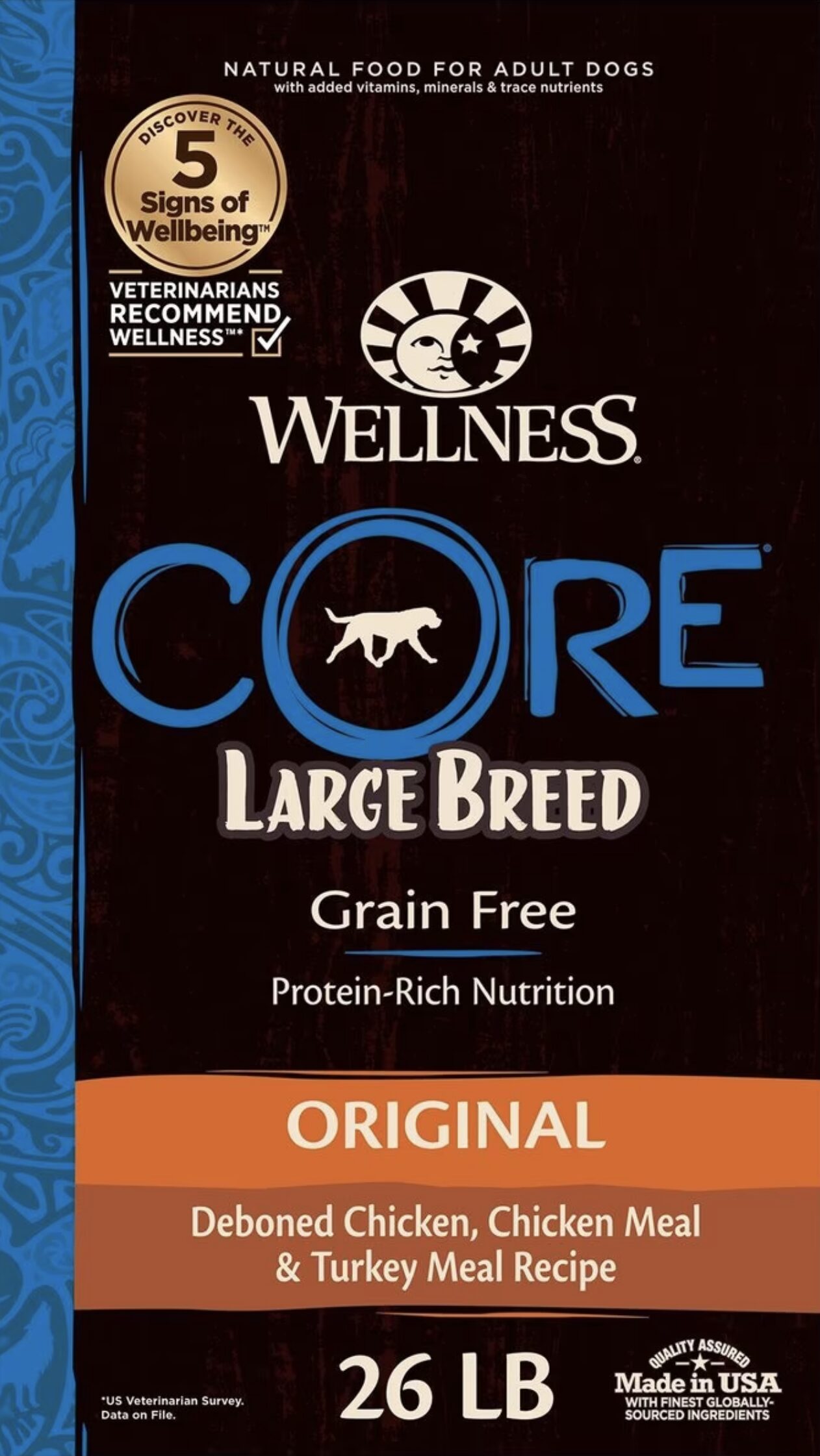
Wellness Core Grain Free Large Breed Formula
Wellness Core Grain Free Large Breed Formula is a nutrient-dense kibble formulated to support healthy joints and mobility in a dog’s later years.
It includes a blend of turkey meal and chicken meal, providing glucosamine and chondroitin, plus joint-benefitting omega fatty acids, which all help dogs suffering from stiff, painful joints.
Wellness Core Grain Free Large Breed Formula is one of 22 products included in our review of the Wellness dog food range. Dry matter label analysis reveals the recipe contains 37.8% protein, 13.3% fat and 40.9% estimated carbs… with an estimated fat-to-protein ratio of 35%.
Read our review of the full Wellness CORE Grain-Free Dog Food (Dry) range here
Things we like
- Glucosamine, chondroitin and omega fatty acids
- Grain-free
- L-Carnitine
Main Ingredients Deboned chicken, chicken meal (source of glucosamine), turkey meal (source of chondroitin sulfate), lentils, peas, dried ground potatoes, tomato pomace, ground flaxseed Type Grain-free Protein Percentage 37.8% AAFCO Standards Maintenance Best For All dogs and senior dogs Sample buyer review...
Read more buyer reviews at Chewy.com"Our German shepherd really likes this chicken-based kibble. She’s been a finicky eater in the past, but is eating this food like it’s a treat. We’re really happy that this food is complete and nutritionally balanced and contains glucosamine and chondroitin to help protect her joints."
-
Best Food For Small Breed Dogs With Arthritis
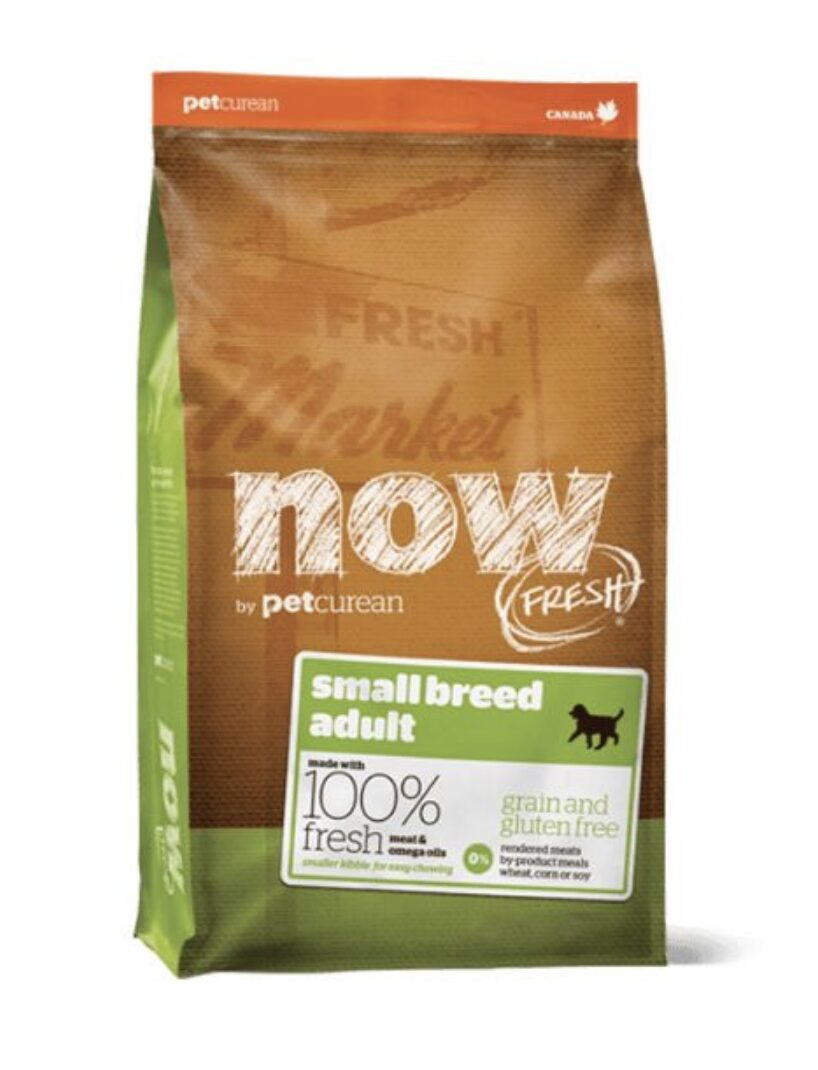
Now Fresh Grain-Free Small Breed Adult
Now Fresh Grain-Free Small Breed Adult food is a smaller kibble suitable for small mouths and we like the fact it includes flaxseed, a source of omega-3 oil, for joint health.
This recipe is one of 11 products included in our review of the Now Fresh dog food range. It derives the majority of its protein from turkey and egg. Dry matter label analysis reveals the recipe contains 30% protein, 18.9% fat and 43.1% estimated carbs… with a fat-to-protein ratio of around 63%.
Maintaining a healthy weight is crucial for dogs with arthritis to reduce stress on joints. The calorie content and balance in this formula help prevent overfeeding.
Read our review of the full nowfresh Dog Food (Dry) range here
Things we like
- Designed for small breeds
- Omega-3 fatty acids
- Fiber-rich
Main Ingredients De-boned turkey, whole dried egg, peas, potatoes, potato flour, pea flour, natural flavour, flaxseed Type Grain-free Protein Percentage 30% AAFCO Standards Maintenance Best For All dogs and senior dogs Sample buyer review...
Read more buyer reviews at Chewy.com"Thought I’d give this a try. I need better food with more vitamins and fewer calories for Charlie. He’s lost weight and feels better with his arthritis."
More Top Picks
To view more top dog foods by category… click the link below that best meets your personal feeding needs.
Frequently Asked Questions
What are the symptoms of arthritis in dogs?
The common signs and symptoms of arthritis in dogs may vary depending on the severity and location of the joint affected. Here are some typical signs to look out for:
- Limping or favoring certain limbs: Dogs with arthritis often show lameness or have difficulty putting weight on one or more limbs. They may limp or exhibit stiffness in their gait.
- Stiffness and decreased mobility: Arthritic dogs may have trouble moving, especially after resting or during cold weather. They may be reluctant to jump, climb stairs, or engage in activities they previously enjoyed.
- Joint swelling and heat: Inflamed joints can become swollen, tender to the touch, and may feel warm. Your dog may display signs of discomfort or pain when you touch or manipulate the affected joints.
- Changes in behavior: Dogs with arthritis may exhibit changes in behavior due to pain. They may become more irritable, have decreased interest in exercise or playtime, or show signs of aggression when their painful joints are touched.
- Licking, chewing, or biting: Dogs may try to alleviate their discomfort by excessively licking, chewing, or biting at the affected joints.
- Muscle atrophy: Over time, the muscles around the arthritic joint may become weaker and visibly smaller due to decreased use and mobility.
- Loss of appetite and weight loss: Some dogs may experience a loss of appetite and subsequent weight loss, potentially due to pain or discomfort associated with arthritis.
How is arthritis diagnosed in dogs?
Diagnosing arthritis in dogs typically involves a combination of a thorough physical examination, a review of the dog’s medical history, and diagnostic tests. Here are the common steps involved in diagnosing arthritis in dogs:
Your veterinarian will conduct a comprehensive physical examination of your dog, evaluating their gait, joint mobility, and any signs of pain or discomfort. They will also discuss your dog’s medical history and any observed symptoms.
X-rays are commonly used to assess the condition of the joints and identify any abnormalities, such as joint damage, narrowing of joint spaces, or the presence of bone spurs. X-rays can help confirm the presence of arthritis and determine its severity.
In some cases, your veterinarian may recommend joint aspiration, which involves extracting a small amount of joint fluid for analysis. This can help identify inflammation, rule out other joint diseases, or detect underlying infections.
While there is no specific blood test to diagnose arthritis, blood tests can be helpful in ruling out other potential causes of joint pain and inflammation, such as infections or autoimmune disorders.
In some instances, additional imaging techniques such as ultrasound or MRI may be recommended to provide a more detailed assessment of joint structures, particularly in complex cases or to evaluate soft tissue damage.
Can arthritis be prevented in dogs?
Unfortunately, arthritis cannot be entirely prevented in dogs, particularly in cases where it is caused by factors such as genetics or developmental abnormalities. However, there are several measures you can take to reduce the risk or delay the onset of arthritis in your dog:
- Maintain a Healthy Weight: Obesity puts additional stress on joints, increasing the risk of arthritis. Keep your dog at a healthy weight through a balanced diet and regular exercise to minimize joint strain.
- Regular Exercise: Provide your dog with regular, low-impact exercise to promote joint mobility and strengthen surrounding muscles. Avoid high-impact activities that may cause excessive stress on the joints.
- Appropriate Nutrition: Feed your dog a well-balanced diet that supports overall joint health. Consider foods that contain joint-supporting nutrients such as glucosamine, chondroitin, and omega-3 fatty acids.
- Prevent Joint Injuries: Minimize the risk of joint injuries by ensuring a safe environment for your dog. Avoid activities or terrains that may cause excessive strain on joints, and be cautious during play or exercise.
- Regular Veterinary Check-ups: Schedule regular veterinary check-ups to monitor your dog’s joint health, especially as they age. Early detection and intervention can help manage arthritis or slow its progression.
- Joint Supplements: Consult with your veterinarian about the potential benefits of joint supplements for your dog. Some supplements, such as glucosamine and chondroitin, may help support joint health.
Are there any specific exercises or activities that can benefit dogs with arthritis?
Yes, there are specific exercises and activities that can benefit dogs with arthritis by promoting joint mobility, muscle strength, and overall well-being. However, it’s important to consult with your veterinarian before starting any exercise regimen to ensure it is appropriate for your dog’s specific condition and limitations.
Here are some exercises and activities that may be beneficial for dogs with arthritis:
- Low-Impact Walking: Regular, controlled walks on flat surfaces can help maintain joint mobility and muscle strength without putting excessive stress on the joints. Start with shorter walks and gradually increase the duration as tolerated.
- Hydrotherapy: Water-based exercises, such as swimming or walking in a shallow pool, can provide low-impact resistance and support joint movement. The buoyancy of water reduces the weight-bearing load on the joints while providing muscle strengthening benefits.
- Controlled Stair Climbing: Gentle stair climbing or walking up and down ramps can help improve joint range of motion and strengthen muscles. Ensure that the stairs or ramps are secure and that your dog can navigate them comfortably.
- Physical Therapy: Veterinary rehabilitation and physical therapy can offer targeted exercises and techniques, such as passive range-of-motion exercises, stretching, and therapeutic massage, to improve joint flexibility and reduce pain.
- Balance Exercises: Incorporate balance exercises using balance boards or cushions specifically designed for dogs. These exercises can help improve joint stability and coordination.
Always monitor your dog’s comfort levels during exercise and adjust the intensity or duration as needed. If you notice any signs of pain or discomfort during or after exercise, consult with your veterinarian for guidance. Remember, every dog is unique, and what works well for one may not be suitable for another. Individualized recommendations from your veterinarian will ensure the exercise plan is safe and effective for your arthritic dog.
Are there any supplements or medications that can help manage arthritis in dogs?
Yes, there are several supplements and medications available that can help manage arthritis in dogs. It’s important to consult with your veterinarian before starting any supplements or medications to ensure they are appropriate for your dog’s specific condition and to determine the correct dosage.
Here are some commonly used options:
- Glucosamine and Chondroitin: These are popular joint supplements that help support cartilage health and reduce inflammation. They are often used together and can be found in various forms, including tablets, chewable treats, and liquid formulations.
- Omega-3 Fatty Acids: Omega-3 fatty acids, usually derived from fish oil, have anti-inflammatory properties and can help reduce joint inflammation and improve mobility. They can be given as supplements or incorporated into the dog’s diet.
- Nonsteroidal Anti-Inflammatory Drugs (NSAIDs): NSAIDs, such as carprofen, meloxicam, or deracoxib, are prescription medications that help reduce pain and inflammation in arthritic dogs. These medications should only be used under veterinary supervision due to potential side effects, and regular monitoring is necessary.
- Adequan: Adequan is an injectable medication that contains polysulfated glycosaminoglycan (PSGAG), which helps support joint health by promoting cartilage repair and reducing inflammation. It is typically administered as a series of injections under veterinary guidance.
- Steroids: In some cases, corticosteroids may be prescribed to manage arthritis flare-ups and reduce inflammation. These medications should be used judiciously and only under veterinary supervision due to potential side effects.
- Prescription Diets: Some veterinary prescription diets are formulated to support joint health and manage arthritis in dogs. These diets often contain specific nutrients, such as omega-3 fatty acids, glucosamine, and chondroitin, to promote joint function and reduce inflammation.
It’s important to note that every dog’s condition is unique, and not all supplements or medications may be suitable or effective for every dog. Your veterinarian will assess your dog’s specific needs and recommend the most appropriate treatment plan, which may include a combination of supplements, medications, and other management strategies tailored to your dog’s condition.
What can I do to help manage my dog's weight and reduce joint strain?
Managing your dog’s weight is crucial for reducing joint strain and managing arthritis. Here are some tips to help you in managing your dog’s weight and minimizing joint strain:
Consult with your Veterinarian: Your veterinarian can assess your dog’s current weight, body condition, and provide specific recommendations for a healthy weight range. They can also help determine the appropriate amount of food and feeding schedule for your dog.
Balanced Diet: Feed your dog a balanced and nutritious diet that is appropriate for their age, size, and activity level. Choose high-quality dog food that provides essential nutrients without excessive calories. Avoid overfeeding or feeding high-calorie treats.
Portion Control: Measure your dog’s food portions carefully to avoid overfeeding. Follow the feeding guidelines provided by the dog food manufacturer or consult your veterinarian for specific recommendations.
Weight Loss Diet: If your dog is overweight, your veterinarian may recommend a weight loss diet. These diets are formulated to be lower in calories while still providing essential nutrients. They can help your dog safely lose weight and reduce joint strain.
Avoid Table Scraps: Resist the temptation to feed your dog table scraps or human food. These can be high in calories and contribute to weight gain. Stick to a healthy, balanced dog food diet.
Regular Exercise: Engage your dog in regular exercise that is suitable for their condition. Low-impact exercises, such as walking, swimming, or controlled play sessions, can help maintain muscle tone and joint mobility without placing excessive stress on the joints. However, consult your veterinarian to determine the appropriate exercise routine for your dog’s specific needs and limitations.
Environmental Modifications: Make your home environment conducive to weight management. Provide a safe, comfortable space for your dog to rest and sleep. Consider using ramps or stairs to help them navigate furniture or elevated surfaces, reducing strain on joints.
Treats and Rewards: If you use treats for training or rewards, choose low-calorie options or use a portion of your dog’s regular food instead. Avoid excessive treat-giving, as it can contribute to weight gain.
Regular Weigh-Ins: Monitor your dog’s weight regularly by weighing them at home or scheduling regular weigh-ins at your veterinarian’s office. This will help you track their progress and make adjustments to their diet and exercise routine as needed.
Final word
The Dog Food Advisor does not accept money, gifts, samples or other incentives in exchange for special consideration in preparing our reviews.
However, we do receive a referral fee from online retailers (like Chewy or Amazon) and from sellers of perishable pet food when readers click over to their websites from ours. This helps cover the cost of operation of our free blog. Thanks for your support.
For more information, please visit our Disclaimer and Disclosure page.








